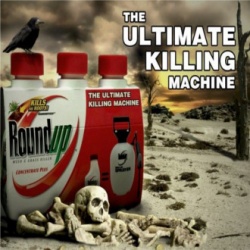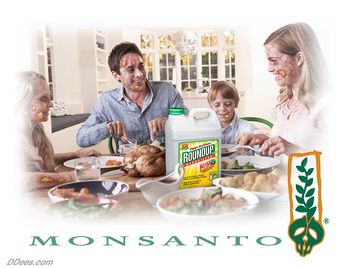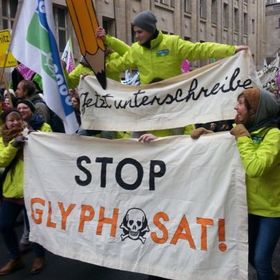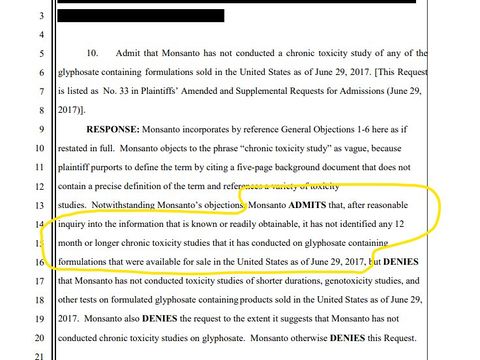Difference between revisions of "Glyphosate"
(EPA) |
(|constitutes=Herbicide, Carcinogen, Ecocide + Safe and Effective / details) |
||
| (51 intermediate revisions by 5 users not shown) | |||
| Line 1: | Line 1: | ||
{{concept | {{concept | ||
| − | |wikipedia= | + | |wikipedia=https://en.wikipedia.org/wiki/Glyphosate |
| − | |description=A | + | |description=A herbicide heavily promoted by Monsanto, increasingly being agreed to be a [[carcinogen]]. |
|start=1970 | |start=1970 | ||
|image=Glyphosate.jpg | |image=Glyphosate.jpg | ||
|type=chemical | |type=chemical | ||
| + | |constitutes=Herbicide, Carcinogen, Ecocide, Safe and Effective | ||
| + | |logo=Glyphosate.svg | ||
| + | |logo_width=200px | ||
| + | |sourcewatch=http://www.sourcewatch.org/index.php/Glyphosate | ||
}} | }} | ||
| + | '''Glyphosate''' is a formerly very widely used herbicide. Its [[toxicity]] was known to [[Monsanto]], but was hidden for decades. Since around [[2014]], its toxicity was increasingly exposed<ref>http://www.unwelcomeguests.net/657</ref> and by [[2019]] it was being ruled as [[carcinogenic]]. In [[2019]] it was banned in [[Austria]] <ref>https://edition.cnn.com/2019/07/03/health/austria-glyphosate-ban-weed-killer-bayer-intl/index.html</ref> and increasing efforts were underway to ban it in Germany<ref>https://www.commondreams.org/news/2019/09/04/because-world-without-insects-not-worth-living-germany-announces-plan-ban-glyphosate</ref> and worldwide.<ref>http://www.pan-uk.org/pesticide-free-towns-campaign-gains-momentum/</ref> It an by August 2019, [[Bayer]] was reported to be seeking to settle 18,000 cancer lawsuits in the US for $8 billion.<ref>https://www.latimes.com/business/story/2019-08-09/bayer-wants-to-settle-roundup-cancer-claims-for-8-billion-sources-say</ref> By June 2020 it had agreed to pay this much to settle cancer claims.<ref>https://www.zerohedge.com/markets/bayer-pays-10bn-settle-thousands-monsanto-glyphosate-lawsuits</ref> | ||
| + | |||
==Official narrative== | ==Official narrative== | ||
| − | [[Wikipedia]]'s page prominently reports the impressively referenced remark that Glyphosate "has been called by experts in herbicides 'virtually ideal' due to its broad spectrum and low toxicity to animal life compared with other herbicides"<ref>http://en.wikipedia.org/w/index.php?title=Glyphosate&oldid=641970930</ref>. As one of the most widely used herbicides<ref>http://npic.orst.edu/factsheets/glyphotech.html</ref>, it is perhaps hardly surprising that the Wikipedia page is subject to particularly close monitoring. The page history exemplifies [[Wikipedia's censorship]] in action; a large number of primary studies have recently been done, pointing out different health risks of glyphosate<ref>{{UG |link=657 |type=episode |desc=the health effects of Glyphosate}}</ref>. These are not permissible under Wikipedia's 'reliability policy', so mention of them is removed from the article (usually within minutes). | + | [[Wikipedia]]'s page prominently reports the impressively referenced remark that Glyphosate "has been called by experts in herbicides 'virtually ideal' due to its broad spectrum and low toxicity to animal life compared with other herbicides"<ref>http://en.wikipedia.org/w/index.php?title=Glyphosate&oldid=641970930</ref>. The page used to read like an advertisement for the product, particularly the sections at the top of the page, which are almost free of any suggestion of difficulties. |
| + | |||
| + | ===Problems=== | ||
| + | As one of the most widely used herbicides<ref>http://npic.orst.edu/factsheets/glyphotech.html</ref>, it is perhaps hardly surprising that the Wikipedia page is subject to particularly close monitoring. The page history exemplifies [[Wikipedia's censorship]] in action; a large number of primary studies have recently been done, pointing out different health risks of glyphosate for humans<ref>{{UG |link=657 |type=episode |desc=the health effects of Glyphosate}}</ref>. These are not permissible under Wikipedia's 'reliability policy', so mention of them is removed from the article (usually within minutes). Studies also suggest that it has been damaging to butterfly populations. Until March 2015, no suggestion of human toxicity was allowed to remain in the article. The first such was the [[International Agency for Research on Cancer]]'s determination that it is "probably carcinogenic in humans", which as of April [[2015]] was still relegated to the last sentence in the article's lede and a downplayed sub-sub-sub-section.<ref>http://en.wikipedia.org/w/index.php?title=Glyphosate&oldid=658965130</ref> | ||
| + | |||
| + | The validity of the findings of supposedly independent peer-reviewed research has been cast into doubt after it emerged in [[2015]] that Monsanto had provided GM-friendly researcher [[Kevin Folta]] with a $25,000 grant that "may be used at your discretion in support of your research and outreach projects."<ref>http://www.gmwatch.org/news/latest-news/16340-kevin-folta-received-25-000-from-monsanto</ref><ref>http://www.nature.com/news/gm-crop-opponents-expand-probe-into-ties-between-scientists-and-industry-1.18146</ref> | ||
| + | |||
| + | [[image:anti-glyphosate_petition_in_Germany.jpg|right|280px]] | ||
| + | Activism against glyphosate stepped up in 2017.{{cn}} A study published in November [[2017]] look at Glyphosate levels in [[California]] residents from [[1993]] determined that "over the next 22 years, we found about a 1,000 percent increase in the levels found in [the urine of] the 100 people, on average."<ref>https://consumer.healthday.com/environmental-health-information-12/chemical-health-news-730/californians-tainted-by-roundup-herbicide-chemical-727829.html</ref> | ||
| + | |||
| + | ==History== | ||
| + | [[Monsanto]] patented the chemical in the early [[1970s]], patents which expired in [[2000]], leaving other manufacturers free to produce it. It was sold together with [[GM crops]] that resist it, so-called "Roundup ready".<ref name=bb/> | ||
==Toxicity== | ==Toxicity== | ||
| − | In 2013, the [[Environmental Protection Agency]] determined glyphosate to be noncarcinogenic, awarding it a toxicity Class of III (on a I to IV scale, where IV is least dangerous) for oral and inhalation exposure, and upped the legal limit for exposure by an order of magnitude.<ref>http://www.regulations.gov/#!documentDetail;D=EPA-HQ-OPP-2012-0132-0009</ref><ref name="epa_reds"> | + | The toxicity of Glyphosate has been a matter of heated debate. The [[EPA]]/[[Monsanto]]-sponsored {{on}} of its safety began to seriously fall apart in [[2015]], when various studies were produced claiming different toxicity and errors were uncovered in EPA studies.<ref>https://gianalytics.org/416-monsanto-epa-fabricate-safety-of-roundup</ref> "Toxicity studies in rodents have found that glyphosate can damage the [[liver]] and [[kidneys]], even for doses in the range generally considered safe for humans."<ref name=bb>https://www.bloomberg.com/opinion/articles/2019-06-04/roundup-cancer-risk-is-only-one-danger-to-humans-animals</ref> It also poses a threat to organisms that live in the soil and are needed for fertility like earthworms.<ref>http://winewaterwatch.org/2019/04/concerns-over-glyphosate-pass-from-human-health-to-the-soil/</ref> |
| + | |||
| + | ===Early health concerns=== | ||
| + | {{YouTubeVideo | ||
| + | |code=zLojaeB78gs | ||
| + | |caption=''Glyphosate Girl, Kelly Ryerson - How to protect yourself from agrotoxins in food'' - chrisbeatcancer YT channel, Aug 29, 2023 | ||
| + | |align=right | ||
| + | |width= | ||
| + | }} | ||
| + | [[GM-Free Cymru]] revealed in [[2015]] that documents prove that [[Monsanto]] and the [[EPA]] knew that Glyphosate was [[carcinogenic]] for mammals since [[1980s]], perhaps as far back as [[1981]].<ref>http://www.gmfreecymru.org/documents/monsanto_knew_of_glyphosate.html</ref> In 1985, the carcinogenic potential of glyphosate was first considered by an EPA panel, which classified glyphosate as a Class C Carcinogen with “suggestive evidence of carcinogenic potential.”<ref name=ga/> | ||
| + | |||
| + | In spite of [http://www.epa.gov/opp00001/chem_search/cleared_reviews/csr_PC-103601_30-Oct-91_265.pdf 1991 documents] suggest that the [[US Environmental Protection Agency]] (EPA) was fully aware of glyphosate’s carcinogenic potential, glyphosate was nevertheless downgraded that year to Class E “evidence of non-carcinogenicity for humans”.<ref name=ga>http://www.globalresearch.ca/links-between-glyphosate-and-a-multitude-of-cancers-that-are-reaching-epidemic-proportions/5486711</ref> | ||
| + | |||
| + | ===2013 EPA : "Non-carcinogenic" === | ||
| + | In [[2013]], the [[Environmental Protection Agency]] said that it had determined glyphosate to be noncarcinogenic, awarding it a toxicity Class of III (on a I to IV scale, where IV is least dangerous) for oral and inhalation exposure, and upped the legal limit for exposure by an order of magnitude.<ref>http://www.regulations.gov/#!documentDetail;D=EPA-HQ-OPP-2012-0132-0009</ref><ref name="epa_reds">http://www.epa.gov/oppsrrd1/REDs/factsheets/0178fact.pdf </ref> This is in spite of "countless"<ref>http://naturalsociety.com/americans-suffering-chronic-disease-due-glyphosate-herbicides-new-study/</ref> studies linking it to cancer, none of which was allowed to remain for long on the Wikipedia page until 2015 when the [[International Agency for Research on Cancer]] named glyphosate as a probable carcinogen.<ref>http://www.thelancet.com/journals/lanonc/article/PIIS1470-2045(15)70134-8/fulltext </ref>. | ||
| + | |||
| + | ===2018 Jury trial: "carcinogenic" === | ||
| + | [[image:Glyphosate court document failure to investigate.jpg|left|480px]] | ||
| + | In [[2018]], a jury determined that [[Monsanto]]'s Roundup ''was'' carcinogenic.<ref>https://gmwatch.org/en/news/latest-news/18533-judge-upholds-monsanto-verdict-but-cuts-award-to-78-million</ref> Court proceedings led Monsanto to admit that it "has not identified any 12 month or longer chronic toxity studies" of current Roundup products.<ref>https://twitter.com/careygillam/status/1090026836816527360</ref><ref>https://usrtk.org/monsanto-papers/federal-court/#edward-hardeman-v-monsanto</ref> | ||
| + | |||
| + | ==2015== | ||
| + | [[image:Glyphosate_ddees.jpg|left|340px|thumbnail|An image from [[the Dees Illustration Studio]].]] | ||
| + | |||
| + | ===International Agency for Research on Cancer : "probably carcinogenic" === | ||
| + | In March [[2015]], the [[WHO]]'s [[International Agency for Research on Cancer]] issued a statement which classified glyphosate as "probably carcinogenic" to humans and "sufficiently demonstrated" as genotoxic in animals.<ref>[http://dx.doi.org/10.1016/%20S1470-2045(15)70134-8 Carcinogenicity of tetrachlorvinphos, parathion, malathion, diazinon, and glyphosate (2015)], | ||
| + | Kathryn Z Guyton, Dana Loomis, Yann Grosse, Fatiha El Ghissassi, Lamia Benbrahim-Tallaa, Neela Guha, Chiara Scoccianti, Heidi Mattock, Kurt Straif, on behalf of the International Agency for Research on Cancer Monograph Working Group, IARC, Lyon, France</ref> It reportedly "missed by a whisker being labelled ‘definitely’ carcinogenic".<ref>http://www.counterpunch.org/2015/09/25/gm-mustard-in-india-a-case-of-monumental-fraud-and-unremitting-regulatory-delinquency/</ref> | ||
| + | |||
| + | ===Environmental Health=== | ||
| + | On August 25, a paper was published in ''[[Environmental Health]]'' which looked at gene expression in the kidneys and liver after long term exposure to very low (US legally permitted) levels. They stated that "Given even very low levels of exposure, Roundup can potentially result in organ damage when it comes to liver and kidney function... The severity we don’t know, but our data say there will be harm given enough time."<ref>http://www.rt.com/usa/313806-monsanto-roundup-kidney-damage/</ref> | ||
| + | |||
| + | ====PR Failure==== | ||
| + | Speaking on the safety of Glyphosate, [[Patrick Moore]], a Monsanto lobbyist claimed on French television that "you can drink a whole quart of it and it won’t hurt you". However, when the interviewer then called his bluff by asking "You want to drink some? We have some here", Moore was visibly taken aback. While claiming it was safe, Moore refused to drink any. He terminated the interview, without drinking any, stating before he left the studio "I’m not stupid!"<ref>http://www.trueactivist.com/monsanto-lobbyist-says-you-can-drink-a-whole-quart-of-roundup-but-does-this-when-offered-some/</ref><ref>http://www.gmwatch.org/videos/6-must-see/16258-lobbyist-patrick-moore-freaks-out-when-offered-a-glass-of-glyphosate</ref> | ||
| + | |||
| + | ====Moves to ban glyphosate==== | ||
| + | The WHO announcement was swiftly followed by an intensification of efforts to ban the pesticide in a several countries. [[Sri Lanka]], suffering a spate of kidney disease widely attributed to glyphosate, has banned it in May [[2015]] <ref>http://www.colombopage.com/archive_15B/May22_1432308620CH.php</ref> while other countries are moving to ban, restrict of further investigate its health impacts.<ref>http://www.globalresearch.ca/endgame-for-glyphosate-the-global-fallout-of-whos-probable-carcinogen-classification/5456263</ref> | ||
| + | |||
| + | =====Removal from stores===== | ||
| + | Mindful of safety concerns, various companies have announced that whatever national legislation is passed, they will be reducing their sales of Glyphosate. At least one large retail chain is phasing out Glyphosate completely from its stores.<ref>http://naturalsociety.com/victory-german-retail-giant-removes-glyphosate-from-350-stores</ref> | ||
| + | |||
| + | ===Environmental Protection Agency: <s>''Safe''</s>=== | ||
| + | An [[Environmental Protection Agency]] report was briefly published on its website indicating that glyphosate was ''not'' carcinogenic, but was deleted after a few days. The EPA were slow to provide the report in response to a [[FOIA]] request by [[Right to Know]] a food safety advocacy group.<ref>http://whowhatwhy.org/2017/03/22/epa-delaying-release-glyphosate-information/</ref> | ||
| + | |||
| + | ==2017== | ||
| + | In [[2017]], [[California]]'s Office of Environmental Health Hazard Assessment announced that they would add Glyphosate to their list of chemicals known to cause [[cancer]].<ref>http://www.reuters.com/article/us-usa-glyphosate-california-idUSKBN19H2K1</ref> In October 2017, after 1 million Europeans requested a ban, 72% of the [[Members of the European Parliament]] voted to ban glyphosate and EU Member states have refused to renew the license.<ref>https://www.march-against-monsanto.com/massive-citizen-initiative-demands-ban-of-monsantos-glyphosate-in-all-50-states/</ref> | ||
== Legal cases == | == Legal cases == | ||
=== False advertising === | === False advertising === | ||
| − | ''The [[New York Times]]'' reported that in 1996, "Dennis C. Vacco, the [[Attorney General of New York]], ordered the company to pull ads that said Roundup was "safer than table salt" and "practically nontoxic" to mammals, birds and fish. The company withdrew the spots, but also said that the phrase in question was permissible under [[EPA]] guidelines."<ref name="urlMonsanto recruits the horticulturist of the San Diego Zoo to pitch its popular herbicide. - New York Times"> | + | ''The [[New York Times]]'' reported that in [[1996]], "[[Dennis C. Vacco]], the [[Attorney General of New York]], ordered the company to pull ads that said Roundup was "safer than table salt" and "practically nontoxic" to mammals, birds and fish. The company withdrew the spots, but also said that the phrase in question was permissible under [[EPA]] guidelines."<ref name="urlMonsanto recruits the horticulturist of the San Diego Zoo to pitch its popular herbicide. - New York Times">http://www.nytimes.com/1997/05/29/business/monsanto-recruits-horticulturist-san-diego-zoo-pitch-its-popular-herbicide.html?ref=monsantocompany </ref> |
=== {{Anchor|Fraud}}Scientific fraud === | === {{Anchor|Fraud}}Scientific fraud === | ||
| − | On two occasions, the United States EPA has caught scientists deliberately falsifying test results at research laboratories hired by [[Monsanto]] to study glyphosate.<ref name=MonsantoBackgrounder> | + | On two occasions, the United States EPA has caught scientists deliberately falsifying test results at research laboratories hired by [[Monsanto]] to study glyphosate.<ref name=MonsantoBackgrounder>http://www.monsanto.com/products/Documents/glyphosate-background-materials/ibt_craven_bkg.pdf </ref> The first incident involved [[Industrial Bio-Test Laboratories|Industrial Biotest Laboratories]] (IBT). The United States Justice Department closed the laboratory in [[1978]], and its leadership was found guilty in [[1983]] of charges of falsifying statements, falsifying scientific data submitted to the government, and mail fraud.<ref name="Faking it The Case against Industrial Bio-Test Laboratories">http://planetwaves.net/contents/faking_it.html </ref> In [[1991]], Don Craven, the owner of [[Craven Laboratories]] and three employees were indicted on 20 felony counts. Craven, along with fourteen employees were found guilty of similar crimes.<ref name="urlwww.epa.gov">http://www.epa.gov/compliance/resources/reports/accomplishments/oeca/fy94accomplishment.pdf</ref> |
| + | |||
| + | Monsanto has stated the Craven Labs investigation was started by the [[EPA]] after a pesticide industry task force discovered irregularities, that the studies have been repeated, and that Roundup's EPA certification does not now use any studies from Craven Labs or IBT.<ref name=MonsantoBackgrounder /> | ||
| + | |||
| + | ==Banning== | ||
| + | * 2019 - [[Austria]] <ref>https://edition.cnn.com/2019/07/03/health/austria-glyphosate-ban-weed-killer-bayer-intl/index.html</ref> | ||
| + | * 2021 - [[Mexico]] <ref>https://www.globalresearch.ca/mexico-ban-glyphosate-gm-corn-presidential-decree-comes-despite-intense-pressure-industry-us-authorities/5738327</ref> - proposed | ||
| − | + | {{SMWDocs}} | |
| − | {{SMWDocs}} | ||
==References== | ==References== | ||
{{reflist}} | {{reflist}} | ||
| − | |||
Latest revision as of 22:40, 2 October 2023
(Herbicide, Carcinogen, Ecocide, Safe and Effective) | |
|---|---|
 | |
 | |
| Type | chemical |
| Start | 1970 |
| Interest of | • William Engdahl • Monsanto • Stephanie Seneff |
| A herbicide heavily promoted by Monsanto, increasingly being agreed to be a carcinogen. | |
Glyphosate is a formerly very widely used herbicide. Its toxicity was known to Monsanto, but was hidden for decades. Since around 2014, its toxicity was increasingly exposed[1] and by 2019 it was being ruled as carcinogenic. In 2019 it was banned in Austria [2] and increasing efforts were underway to ban it in Germany[3] and worldwide.[4] It an by August 2019, Bayer was reported to be seeking to settle 18,000 cancer lawsuits in the US for $8 billion.[5] By June 2020 it had agreed to pay this much to settle cancer claims.[6]
Contents
Official narrative
Wikipedia's page prominently reports the impressively referenced remark that Glyphosate "has been called by experts in herbicides 'virtually ideal' due to its broad spectrum and low toxicity to animal life compared with other herbicides"[7]. The page used to read like an advertisement for the product, particularly the sections at the top of the page, which are almost free of any suggestion of difficulties.
Problems
As one of the most widely used herbicides[8], it is perhaps hardly surprising that the Wikipedia page is subject to particularly close monitoring. The page history exemplifies Wikipedia's censorship in action; a large number of primary studies have recently been done, pointing out different health risks of glyphosate for humans[9]. These are not permissible under Wikipedia's 'reliability policy', so mention of them is removed from the article (usually within minutes). Studies also suggest that it has been damaging to butterfly populations. Until March 2015, no suggestion of human toxicity was allowed to remain in the article. The first such was the International Agency for Research on Cancer's determination that it is "probably carcinogenic in humans", which as of April 2015 was still relegated to the last sentence in the article's lede and a downplayed sub-sub-sub-section.[10]
The validity of the findings of supposedly independent peer-reviewed research has been cast into doubt after it emerged in 2015 that Monsanto had provided GM-friendly researcher Kevin Folta with a $25,000 grant that "may be used at your discretion in support of your research and outreach projects."[11][12]
Activism against glyphosate stepped up in 2017.[citation needed] A study published in November 2017 look at Glyphosate levels in California residents from 1993 determined that "over the next 22 years, we found about a 1,000 percent increase in the levels found in [the urine of] the 100 people, on average."[13]
History
Monsanto patented the chemical in the early 1970s, patents which expired in 2000, leaving other manufacturers free to produce it. It was sold together with GM crops that resist it, so-called "Roundup ready".[14]
Toxicity
The toxicity of Glyphosate has been a matter of heated debate. The EPA/Monsanto-sponsored official narrative of its safety began to seriously fall apart in 2015, when various studies were produced claiming different toxicity and errors were uncovered in EPA studies.[15] "Toxicity studies in rodents have found that glyphosate can damage the liver and kidneys, even for doses in the range generally considered safe for humans."[14] It also poses a threat to organisms that live in the soil and are needed for fertility like earthworms.[16]
Early health concerns
| Glyphosate Girl, Kelly Ryerson - How to protect yourself from agrotoxins in food - chrisbeatcancer YT channel, Aug 29, 2023 |
GM-Free Cymru revealed in 2015 that documents prove that Monsanto and the EPA knew that Glyphosate was carcinogenic for mammals since 1980s, perhaps as far back as 1981.[17] In 1985, the carcinogenic potential of glyphosate was first considered by an EPA panel, which classified glyphosate as a Class C Carcinogen with “suggestive evidence of carcinogenic potential.”[18]
In spite of 1991 documents suggest that the US Environmental Protection Agency (EPA) was fully aware of glyphosate’s carcinogenic potential, glyphosate was nevertheless downgraded that year to Class E “evidence of non-carcinogenicity for humans”.[18]
2013 EPA : "Non-carcinogenic"
In 2013, the Environmental Protection Agency said that it had determined glyphosate to be noncarcinogenic, awarding it a toxicity Class of III (on a I to IV scale, where IV is least dangerous) for oral and inhalation exposure, and upped the legal limit for exposure by an order of magnitude.[19][20] This is in spite of "countless"[21] studies linking it to cancer, none of which was allowed to remain for long on the Wikipedia page until 2015 when the International Agency for Research on Cancer named glyphosate as a probable carcinogen.[22].
2018 Jury trial: "carcinogenic"
In 2018, a jury determined that Monsanto's Roundup was carcinogenic.[23] Court proceedings led Monsanto to admit that it "has not identified any 12 month or longer chronic toxity studies" of current Roundup products.[24][25]
2015

International Agency for Research on Cancer : "probably carcinogenic"
In March 2015, the WHO's International Agency for Research on Cancer issued a statement which classified glyphosate as "probably carcinogenic" to humans and "sufficiently demonstrated" as genotoxic in animals.[26] It reportedly "missed by a whisker being labelled ‘definitely’ carcinogenic".[27]
Environmental Health
On August 25, a paper was published in Environmental Health which looked at gene expression in the kidneys and liver after long term exposure to very low (US legally permitted) levels. They stated that "Given even very low levels of exposure, Roundup can potentially result in organ damage when it comes to liver and kidney function... The severity we don’t know, but our data say there will be harm given enough time."[28]
PR Failure
Speaking on the safety of Glyphosate, Patrick Moore, a Monsanto lobbyist claimed on French television that "you can drink a whole quart of it and it won’t hurt you". However, when the interviewer then called his bluff by asking "You want to drink some? We have some here", Moore was visibly taken aback. While claiming it was safe, Moore refused to drink any. He terminated the interview, without drinking any, stating before he left the studio "I’m not stupid!"[29][30]
Moves to ban glyphosate
The WHO announcement was swiftly followed by an intensification of efforts to ban the pesticide in a several countries. Sri Lanka, suffering a spate of kidney disease widely attributed to glyphosate, has banned it in May 2015 [31] while other countries are moving to ban, restrict of further investigate its health impacts.[32]
Removal from stores
Mindful of safety concerns, various companies have announced that whatever national legislation is passed, they will be reducing their sales of Glyphosate. At least one large retail chain is phasing out Glyphosate completely from its stores.[33]
Environmental Protection Agency: Safe
An Environmental Protection Agency report was briefly published on its website indicating that glyphosate was not carcinogenic, but was deleted after a few days. The EPA were slow to provide the report in response to a FOIA request by Right to Know a food safety advocacy group.[34]
2017
In 2017, California's Office of Environmental Health Hazard Assessment announced that they would add Glyphosate to their list of chemicals known to cause cancer.[35] In October 2017, after 1 million Europeans requested a ban, 72% of the Members of the European Parliament voted to ban glyphosate and EU Member states have refused to renew the license.[36]
Legal cases
False advertising
The New York Times reported that in 1996, "Dennis C. Vacco, the Attorney General of New York, ordered the company to pull ads that said Roundup was "safer than table salt" and "practically nontoxic" to mammals, birds and fish. The company withdrew the spots, but also said that the phrase in question was permissible under EPA guidelines."[37]
Scientific fraud
On two occasions, the United States EPA has caught scientists deliberately falsifying test results at research laboratories hired by Monsanto to study glyphosate.[38] The first incident involved Industrial Biotest Laboratories (IBT). The United States Justice Department closed the laboratory in 1978, and its leadership was found guilty in 1983 of charges of falsifying statements, falsifying scientific data submitted to the government, and mail fraud.[39] In 1991, Don Craven, the owner of Craven Laboratories and three employees were indicted on 20 felony counts. Craven, along with fourteen employees were found guilty of similar crimes.[40]
Monsanto has stated the Craven Labs investigation was started by the EPA after a pesticide industry task force discovered irregularities, that the studies have been repeated, and that Roundup's EPA certification does not now use any studies from Craven Labs or IBT.[38]
Banning
Related Quotations
| Page | Quote | Author | Date |
|---|---|---|---|
| Big chemical | “It's the pesticide merchants and GMO companies....they are the real decision makers. They use lobbyist to shape national policy by almost buying politicians. It's this corruption that subverts the EPA. I am not a prophet, but I can see a very dark future if we fail to ban glyphosate and all other neurotoxins and carcinogens in or food and natural world.” | Evaggelos Vallinatos long time EPA scientist | 2017 |
| Big chemical | “We are convinced there are more than ample science to raise serious concerns over rising herbicide use and exposure, yet not nearly enough is being done to either dismiss such concerns or study them in a meaningful way. People think global warming is the biggest threat, but it's not. This is.” | Paul Winchester - medical director of the neonatal intensive care unit at Franciscan St. Francis Health Care in Indianapolis | 2017 |
| Vandana Shiva | “When Bill Gates pours money into Africa for feeding the poor in Africa and preventing famine, he’s pushing the failed Green Revolution, he’s pushing chemicals, pushing GMOs, pushing patterns.” | Vandana Shiva | |
| Vandana Shiva | “If you look at the graph of the growth of G.M.O.s, the growth of application of glyphosate and autism, it’s literally a one-to-one correspondence. And you could make that graph for kidney failure, you could make that graph for diabetes, you could make that graph even for Alzheimer’s.” | Vandana Shiva |
Related Documents
| Title | Type | Publication date | Author(s) | Description |
|---|---|---|---|---|
| File:Glyphosate - Pathway to Modern Diseases.Pdf | paper | 18 April 2013 | Anthony Samsel Stephanie Seneff | An in depth technical appraisal of the severe adverse effects on human health of the burgeoning use of Monsanto's Roundup, implicating it as a major factor in most of the so-called 'Western diet diseases'. |
| File:Glyphosate Worse than We Could Imagine Engdahl.pdf | article | 27 April 2019 | William Engdahl | This article summarizes some recent developments about Glyphosate (Bayer/Monsanto). |
| File:Toxicity of Roundup and Roundup-tolerant GM maize.pdf | paper | 2 August 2012 | Gilles-Eric Séralini Emilie Clair Robin Mesnage Steeve Gress Nicolas Defarge Manuela Malatesta Didier Hennequin Joël Spiroux de Vendômois | In this study researchers led by Gilles-Eric Seralini from CRIIGEN have found that rats fed on a diet containing NK603 Roundup tolerant GM maize or given water containing Roundup, at levels permitted in drinking water and GM crops in the US, developed cancers faster and died earlier than rats fed on a standard diet. They suffered breast cancer and severe liver and kidney damage. |
References
- ↑ http://www.unwelcomeguests.net/657
- ↑ https://edition.cnn.com/2019/07/03/health/austria-glyphosate-ban-weed-killer-bayer-intl/index.html
- ↑ https://www.commondreams.org/news/2019/09/04/because-world-without-insects-not-worth-living-germany-announces-plan-ban-glyphosate
- ↑ http://www.pan-uk.org/pesticide-free-towns-campaign-gains-momentum/
- ↑ https://www.latimes.com/business/story/2019-08-09/bayer-wants-to-settle-roundup-cancer-claims-for-8-billion-sources-say
- ↑ https://www.zerohedge.com/markets/bayer-pays-10bn-settle-thousands-monsanto-glyphosate-lawsuits
- ↑ http://en.wikipedia.org/w/index.php?title=Glyphosate&oldid=641970930
- ↑ http://npic.orst.edu/factsheets/glyphotech.html
- ↑
- ↑ http://en.wikipedia.org/w/index.php?title=Glyphosate&oldid=658965130
- ↑ http://www.gmwatch.org/news/latest-news/16340-kevin-folta-received-25-000-from-monsanto
- ↑ http://www.nature.com/news/gm-crop-opponents-expand-probe-into-ties-between-scientists-and-industry-1.18146
- ↑ https://consumer.healthday.com/environmental-health-information-12/chemical-health-news-730/californians-tainted-by-roundup-herbicide-chemical-727829.html
- ↑ a b https://www.bloomberg.com/opinion/articles/2019-06-04/roundup-cancer-risk-is-only-one-danger-to-humans-animals
- ↑ https://gianalytics.org/416-monsanto-epa-fabricate-safety-of-roundup
- ↑ http://winewaterwatch.org/2019/04/concerns-over-glyphosate-pass-from-human-health-to-the-soil/
- ↑ http://www.gmfreecymru.org/documents/monsanto_knew_of_glyphosate.html
- ↑ a b http://www.globalresearch.ca/links-between-glyphosate-and-a-multitude-of-cancers-that-are-reaching-epidemic-proportions/5486711
- ↑ http://www.regulations.gov/#!documentDetail;D=EPA-HQ-OPP-2012-0132-0009
- ↑ http://www.epa.gov/oppsrrd1/REDs/factsheets/0178fact.pdf
- ↑ http://naturalsociety.com/americans-suffering-chronic-disease-due-glyphosate-herbicides-new-study/
- ↑ http://www.thelancet.com/journals/lanonc/article/PIIS1470-2045(15)70134-8/fulltext
- ↑ https://gmwatch.org/en/news/latest-news/18533-judge-upholds-monsanto-verdict-but-cuts-award-to-78-million
- ↑ https://twitter.com/careygillam/status/1090026836816527360
- ↑ https://usrtk.org/monsanto-papers/federal-court/#edward-hardeman-v-monsanto
- ↑ Carcinogenicity of tetrachlorvinphos, parathion, malathion, diazinon, and glyphosate (2015), Kathryn Z Guyton, Dana Loomis, Yann Grosse, Fatiha El Ghissassi, Lamia Benbrahim-Tallaa, Neela Guha, Chiara Scoccianti, Heidi Mattock, Kurt Straif, on behalf of the International Agency for Research on Cancer Monograph Working Group, IARC, Lyon, France
- ↑ http://www.counterpunch.org/2015/09/25/gm-mustard-in-india-a-case-of-monumental-fraud-and-unremitting-regulatory-delinquency/
- ↑ http://www.rt.com/usa/313806-monsanto-roundup-kidney-damage/
- ↑ http://www.trueactivist.com/monsanto-lobbyist-says-you-can-drink-a-whole-quart-of-roundup-but-does-this-when-offered-some/
- ↑ http://www.gmwatch.org/videos/6-must-see/16258-lobbyist-patrick-moore-freaks-out-when-offered-a-glass-of-glyphosate
- ↑ http://www.colombopage.com/archive_15B/May22_1432308620CH.php
- ↑ http://www.globalresearch.ca/endgame-for-glyphosate-the-global-fallout-of-whos-probable-carcinogen-classification/5456263
- ↑ http://naturalsociety.com/victory-german-retail-giant-removes-glyphosate-from-350-stores
- ↑ http://whowhatwhy.org/2017/03/22/epa-delaying-release-glyphosate-information/
- ↑ http://www.reuters.com/article/us-usa-glyphosate-california-idUSKBN19H2K1
- ↑ https://www.march-against-monsanto.com/massive-citizen-initiative-demands-ban-of-monsantos-glyphosate-in-all-50-states/
- ↑ http://www.nytimes.com/1997/05/29/business/monsanto-recruits-horticulturist-san-diego-zoo-pitch-its-popular-herbicide.html?ref=monsantocompany
- ↑ a b http://www.monsanto.com/products/Documents/glyphosate-background-materials/ibt_craven_bkg.pdf
- ↑ http://planetwaves.net/contents/faking_it.html
- ↑ http://www.epa.gov/compliance/resources/reports/accomplishments/oeca/fy94accomplishment.pdf
- ↑ https://edition.cnn.com/2019/07/03/health/austria-glyphosate-ban-weed-killer-bayer-intl/index.html
- ↑ https://www.globalresearch.ca/mexico-ban-glyphosate-gm-corn-presidential-decree-comes-despite-intense-pressure-industry-us-authorities/5738327

